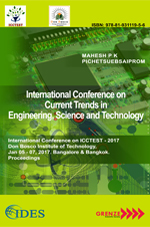Social and Democratic Information Behavior ofScientists and Policy makers in India
Conference: Third International Conference on Current Trends in Engineering Science and Technology
AbstractThis research study reports results of information behaviour by members of faculty and research scholars of various departments of social sciences working at universities with a sample of 300 and Members of Legislative Assembly and Council with 216 samples in Karnataka State, India. The results reveal that 29.3% and 20.3% of Social Scientists indicated medium and high level of awareness of primary sources - Primary Journals are found to be at scale level 5 and 9. The usage of primary journals by social scientists is found to be 28% at level 4, 24% of the respondent’s opined use of primary Conference Proceedings at level 5 as medium level of use. Similarly the use of Secondary Information Sources at scale 8 and 9 particularly in case of Dictionaries (31.0% and 5.0%), Encyclopaedias (22.3% and 6.3%), Indexing Periodicals (7.0% and 15.3%) and Abstracting Periodicals (5.7% and 20.7%). For searching information from Journals Literature available in CD-ROM version, Keywords (43.7%) followed by Keywords with logical operators (39.7%) have been used for finding the required information. Statistical inference reveals rejection of null hypothesis `there is no association between designation of the respondents and awareness of primary information resources’. On the other hand, educational qualification possessed by Legislative members, more than half of them possess graduate degree as their academic qualification (57.4%) and just 16.7% of the respondents possess graduate degree while only 26.8% of the respondents possess degree in law and just 1.8% possess post-graduate degree in law. About 42.6% indicated the importance of information required to discharge their duties and responsibilities as a Policy Maker in the scale 8, as a Scholar (27.8%) on a scale 6, as a politician (64.8%) on a scale 10 and as a Councillor (51.9%) on a scale 8. The most preferred information agencies/sources very often contacted for obtaining useful information are by means of contacting the people of Karnataka State Legislative Library, listening Radio programmes, viewing Television programmes and reading the newspapers. The methods adopted for obtaining needed information quite often by means of sending their assistants to libraries to gather information (35.2%) and personally visiting for the information source (64.8%). The null hypotheses `There is no association between Members of Legislature and Opinion on the usefulness of the resources of the Karnataka State Legislature Library’ is accepted using F ANOVA test. The studies concludes with a note revamp the existing library system in its structure and adopt latest technologies and educate and train social scientists and Legislators in using these resources in the interest of academic, government policies and decision making of the country. |
ICCTEST - 2017
|
